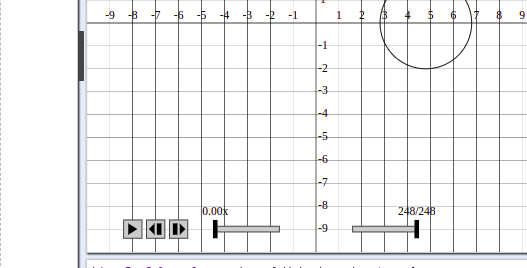Tuesday July 24th
GSoC Day 72 and ICFP news!
Was tired today
- But today turned out fine. I made some fixes for a pull request that I had outstanding. I like people who are picky with their pull requests. As I’m learning, it helps me more when people are picky about whitespace and things lining up exactly and that sort of thing.
- So far, that PR passed one set of continuous integration tests, and it’s running through another as I write this.
The historySlider works!
- I have to say, it also looks pretty sick :) It’s the right-hand side slider!

- Chris wants the spacing to look more like
[A] [-----B-----] [C] [D] [-----E-----] [F]but I’m going to wait on that one because people are picky about their spacing. That’s very much a kind of UI-to taste type thing. I did make the speedSlider (left hand side) say x so there is less ambiguity about what thespeedSlideris doing.
To the left
- Is the
speedSlider. It has thexNumdenomation. To the right is thehistorySliderwhich goes back in time. It counts total frames in the two lists. - So for example, say for our
pastStateslist we have 5 states and for ourfutureStateslist we have three states. That’s 8 states total. So the total slider count is 8 and we put our slider to the correct state in relation to the two lists via thetravelToTimefunction which compares where we want to be to where we are and adds or subtracts (ie diffs) based on the relative lists by taking the current state and either adding it to the head of the futureState list or the pastStates list. We find relationships between the two lists by summing the lengths and constraining the values so we never go below 1 or the maximum value of our slider. We also have to ensure that our desired value matches the type of diff, which are both Ints (whole numbers).
Interestingly
- We used
gotoday, which was also used when I watched the videos by theUtah Haskellgroup this morning. I saw their video, which was on two chapters I’ve completed (7 and 8 I believe), and it was really interesting to see how their solutions differed from my own when I was trying to solve the problems by myself. I would definitely say that’s a good experience to have. Right now, I’m on Chapter 11 of the book. - I also became interested in learning Isabelle, in an effort to learn something that is similar to Haskell (ie types) but also will help me learn about how to write and check proofs. This will make me a more conscientious and accurate programmer, who is better prepared to break problems down into smaller ones and solve them accordingly (at least according to Haskell Yoda). :)
Other than that
- Great news! I got in as a student volunteer for ICFP!!! :) I’m definitely psyched! So looking forward to attending!!!
Written on July 24, 2018
